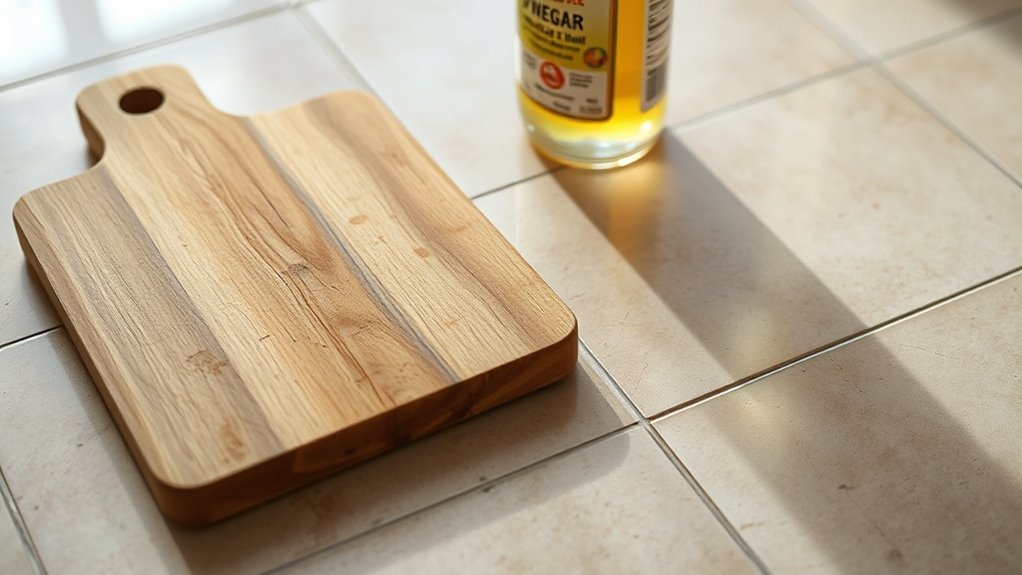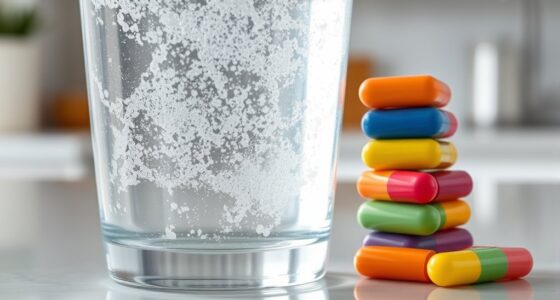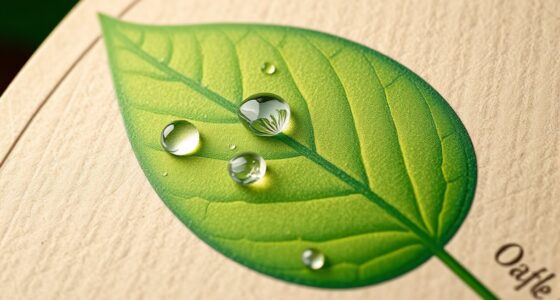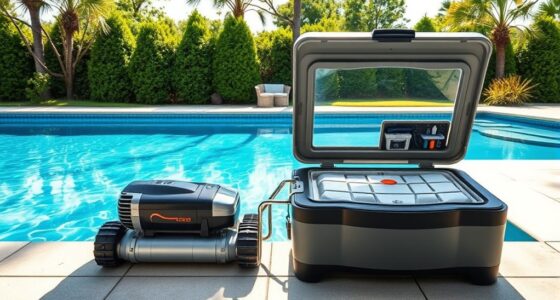Vinegar can damage your home surfaces because its acidity penetrates porous stones like marble, causing etching and erosion. It also softens rubber seals, cracks plastic parts, and dulls metal finishes, leading to corrosion and tarnishing. Wooden floors can warp or lose shine, while electronic screens may peel or cloud due to coating damage. If you keep using vinegar without caution, you risk costly repairs—learn how to protect your surfaces effectively.
Key Takeaways
- Vinegar’s acetic acid penetrates porous surfaces like marble and limestone, causing internal weakening and irreversible etching.
- It damages unsealed wooden floors by causing warping, dullness, and stripping protective finishes like polyurethane.
- Vinegar accelerates deterioration of rubber seals, gaskets, and hoses, leading to cracks, leaks, and appliance failure.
- Acidic exposure tarnishes metal surfaces, strips gold plating, and causes corrosion, reducing their lifespan and aesthetic appeal.
- It damages protective coatings on electronics and delicate surfaces, resulting in peeling, clouding, and decreased functionality.
Damage to Natural Stone Surfaces
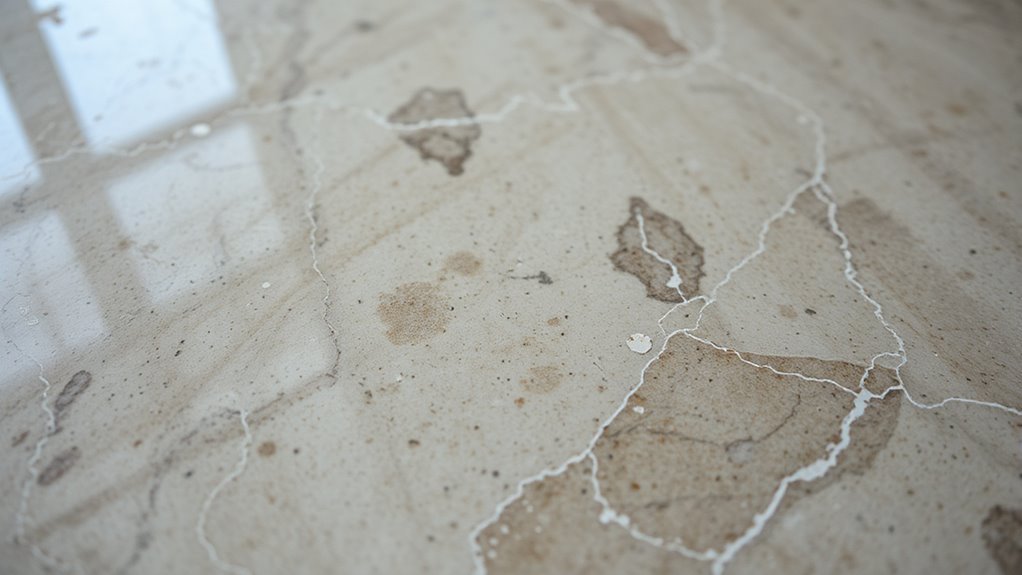
Vinegar’s acetic acid can quickly damage natural stone surfaces like marble and limestone. Because these stones are porous, acidic substances can penetrate and weaken their internal structure, leading to erosion and pitting. Repeated use of vinegar dissolves the protective coating or sealant that shields the stone, exposing it to stains and further damage. This results in a dull, less polished appearance and irreversible surface deterioration. The acid can cause surface etching, making the stone rough and less attractive. Natural stone relies on a protective coating to maintain its shine and resilience. When vinegar erodes this coating, it leaves the surface vulnerable to staining and erosion, considerably reducing the lifespan of your stone surfaces. Understanding material properties is essential to choosing the right cleaning methods and preserving your natural stone’s appearance. Additionally, using acidic cleaners on porous surfaces accelerates deterioration and can lead to costly repairs. Incorporating proper cleaning techniques can help maintain the integrity and beauty of your natural stone surfaces over time. Avoid acidic cleaners to keep your natural stone looking its best.
Degradation of Rubber Components
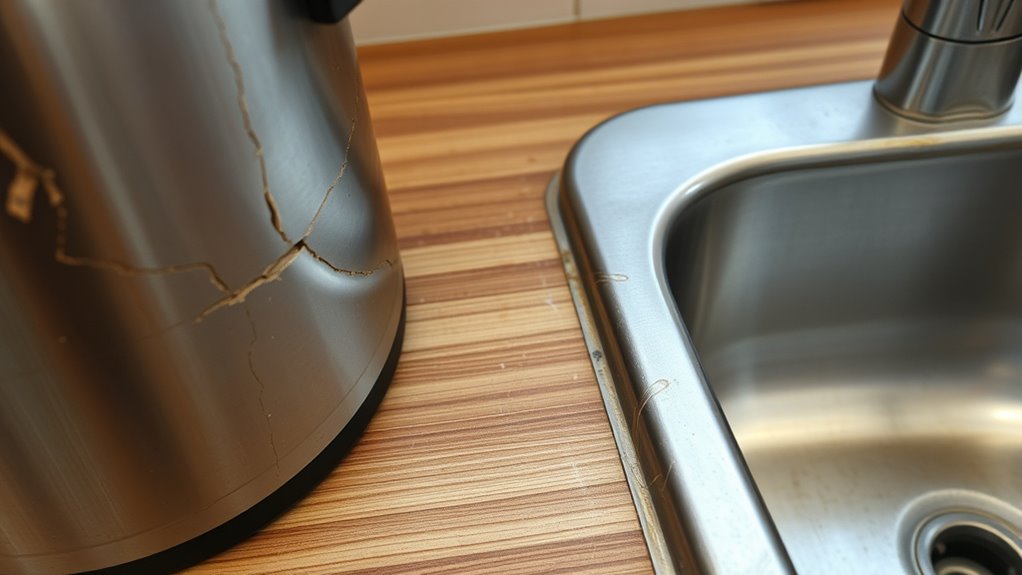
Because of its acidic nature, vinegar can considerably degrade rubber components like seals, gaskets, and hoses over time. This vinegar damage accelerates rubber degradation, causing rubber seals and hoses to dry out, crack, and deteriorate. As rubber components weaken, you may notice rubber swelling or shrinkage, impairing the proper function of household devices. Repeated exposure to vinegar can lead to rubber deterioration, increasing the risk of appliance leaks and costly repairs. The acetic acid breaks down the flexible rubber, reducing its lifespan and compromising its sealing ability. Additionally, the chemical properties of vinegar can cause further damage to other sensitive materials in household appliances. Over time, this rubber degradation can cause leaks in washing machines, dishwashers, and other appliances, making vinegar an unsuitable cleaner for rubber parts. Protect your household devices by avoiding vinegar on rubber components.
Harm to Kitchen Knives and Metal Finishes
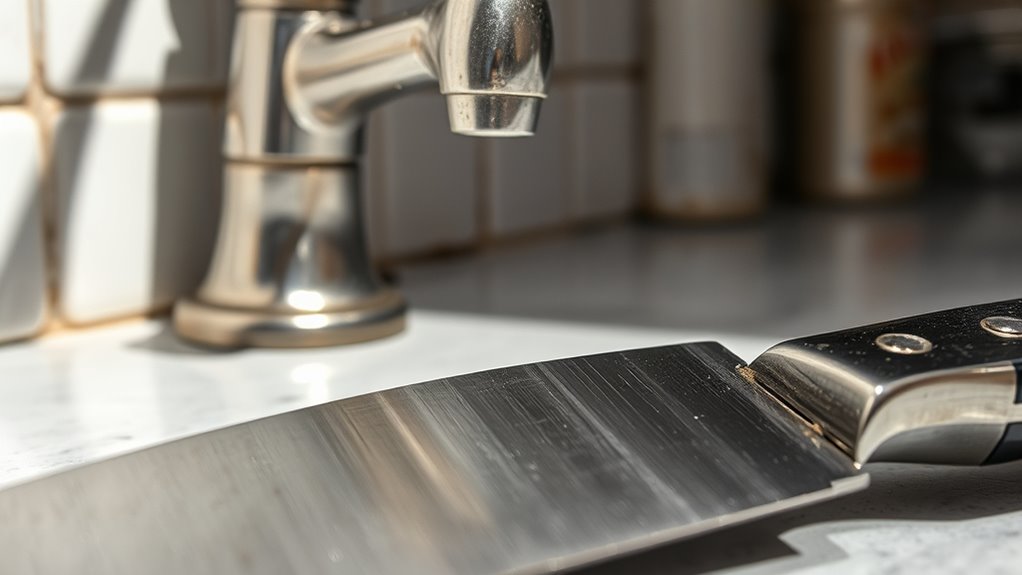
Vinegar’s acidity can cause corrosion and pitting on your knives, making them dull and less effective over time. It can also tarnish metal finishes and damage handles, reducing both their appearance and durability. Using vinegar regularly can weaken metal edges and lead to chipping or breaking, compromising your cutlery’s lifespan. Additionally, it may interfere with metal protection, accelerating deterioration. To prevent these issues, it’s best to avoid using vinegar on surfaces susceptible to corrosion, especially those with protective coatings that can be compromised. Proper maintenance of metal surfaces and awareness of chemical reactions can help extend the lifespan of your kitchen tools. Being mindful of environmental factors like humidity and cleaning habits can further support the integrity of your metal items.
Blade Corrosion Risks
Using vinegar to clean metal kitchen tools can inadvertently cause corrosion and pitting on blades. The acetic acid in vinegar reacts chemically with metal surfaces, accelerating metal corrosion and leading to blade damage. Over time, this exposure weakens the blades’ sharpness and dulls their edges. Prolonged contact can also degrade the metal finish, resulting in discoloration and a compromised appearance. Additionally, vinegar’s acidity promotes rust formation, especially on blades with scratches or imperfections. This corrosion process can undermine the blade’s integrity, making it more prone to breakage. Regular cleaning with vinegar shortens the lifespan of high-quality knives by gradually eroding their protective coatings and exposing the underlying metal to damage, ultimately compromising their effectiveness and durability. Furthermore, improper cleaning techniques can accelerate surface deterioration, worsening the damage over time. Using vinegar frequently on metal surfaces can also interfere with the development of protective oxidation layers, which normally shield the metal from corrosion and protective coatings, reducing their effectiveness and longevity.
Metal Tarnishing and Pitting
Repeated exposure to vinegar can lead to significant damage beyond blade corrosion, causing metal surfaces to tarnish and develop pits. The acetic acid in vinegar strips away protective coatings on metal surfaces like stainless steel, copper, and aluminum, accelerating corrosion and discoloration. Over time, metal tarnishing becomes visible as dullness or dark spots, while pitting creates tiny holes that weaken the integrity of your metal utensils and finishes. These pits compromise the surface’s smoothness, making the metal more prone to further damage. Prolonged contact with vinegar not only dulls blades and tarnishes finishes but also reduces the lifespan of your metal items. To protect your metal surfaces from such damage, avoid frequent vinegar use on kitchen knives, appliances, and decorative fixtures.
Damage to Handles
Exposure to vinegar can directly damage the handles of your kitchen knives and other metal finishes, leading to corrosion and deterioration over time. The acidity causes pitting and rust, weakening the metal and reducing its lifespan. Prolonged exposure erodes protective coatings, making metal handles more vulnerable to damage and wear. This erosion can result in tarnishing and discoloration, diminishing the aesthetic appeal of your utensils. Over time, the metal becomes more susceptible to breakage and needs replacing sooner. To help you understand the impact better, consider these points:
- Acidic residues cause corrosion and pitting
- Protective coatings break down, exposing metal
- Metal handles tarnish and discolor
- Increased wear leads to damage and rust
- Abrasive cleaning methods can accelerate surface deterioration
- Repeated exposure to vinegar can weaken metal finishes, making handles more prone to damage
- The deterioration process can be exacerbated by automation technologies, which may lead to more frequent cleaning or maintenance routines, increasing the risk of damage
- Corrosion processes are further accelerated by environmental factors such as humidity and temperature fluctuations, compounding the damage to metal surfaces
- Additionally, improper storage conditions can accelerate corrosion, especially in humid environments, further compromising the integrity of metal handles
Vinegar accelerates the erosion process, compromising the integrity of your metal handles.
Dulling and Warping of Wooden Flooring
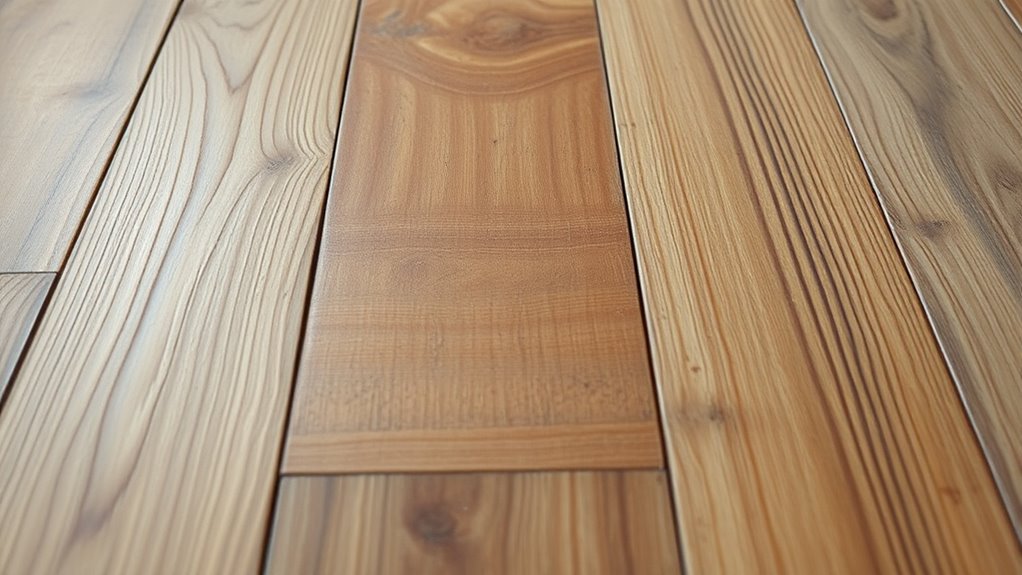
Vinegar’s acetic acid can quickly tarnish the appearance of your wooden floors by breaking down their protective finish. Over time, repeated vinegar damage causes the surface to develop a dull appearance, losing its shine and smoothness. The acidity can penetrate unsealed floors, leading to warping, swelling, or structural deterioration. When the polyurethane or varnish layer is stripped away, raw wood becomes exposed, increasing vulnerability to damage. Surface etching further erodes the wood’s integrity, making repairs costly. Additionally, surface deterioration can accelerate if the damage is left unaddressed, compounding the problem. Using vinegar regularly can also interfere with the wooden flooring finishes, further compromising their protective qualities. Proper maintenance and understanding of home surface materials can help prevent such damage and prolong the life of your flooring. For example, avoiding harsh chemical cleaners and opting for gentle, recommended cleaning products can maintain the integrity of the wood surface. Below is a quick comparison of vinegar’s effects:
| Effect | Description | Result |
|---|---|---|
| Dull appearance | Loss of shine due to finish breakdown | Reduced aesthetic appeal |
| Warping | Wood fibers swell or bend | Floor instability |
| Surface etching | Deep damage to wood surface | Structural deterioration |
Tarnishing and Wear of Gold Plated Fixtures
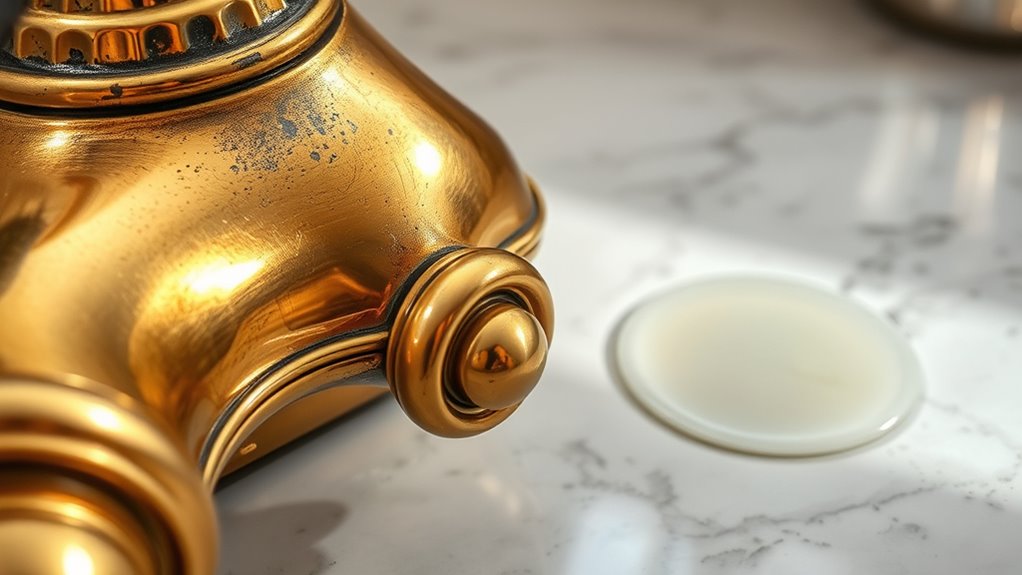
When you clean gold-plated fixtures with vinegar, the acetic acid can quickly strip away the delicate gold layer, causing tarnishing and dullness. The acidity dissolves the thin gold plating, accelerating wear and resulting in a patchy appearance. Over time, corrosion can set in, weakening the fixture’s structure. Removing the protective coating makes the fixture more vulnerable to further tarnish and damage. To preserve your fixtures, avoid harsh chemicals like vinegar. Instead, use mild soap and water or products specifically designed for gold plating. Regular exposure to vinegar not only dulls the shine but also shortens the lifespan of your fixtures by damaging the protective layer and promoting corrosion. Protect your investment by cleaning with gentle, suitable solutions.
Corrosion of Electronic Screen Coatings
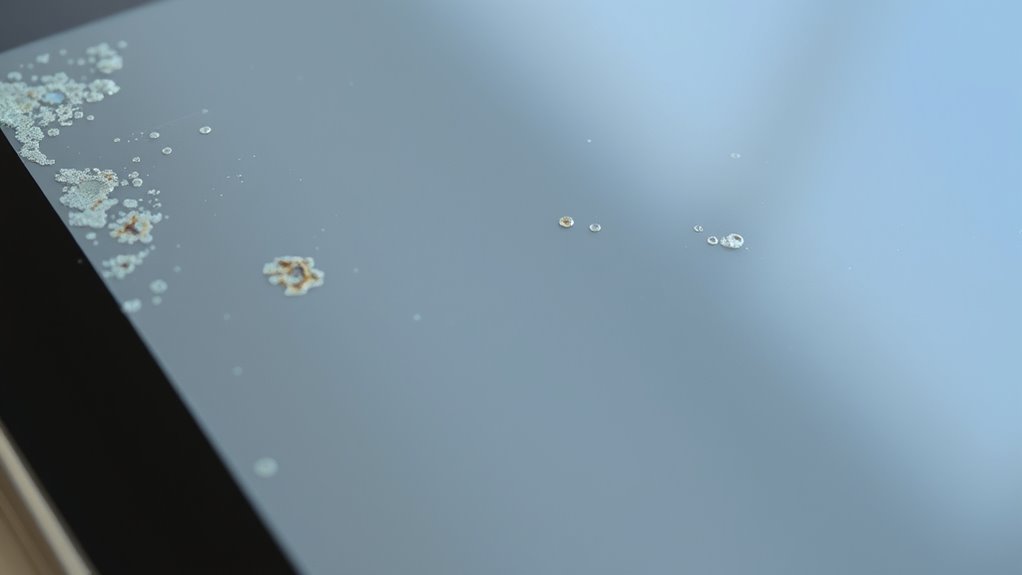
Using vinegar on your electronic screens risks damaging their protective coatings, which can lead to decreased responsiveness and clarity. The acidity can cause corrosion, especially in tiny cracks or edges, speeding up the deterioration process. To keep your screens in top condition, follow proper cleaning methods and avoid harsh acids like vinegar.
Coating Damage Risks
The acidic properties of vinegar can cause significant damage to electronic screen coatings by breaking down their protective layers. This leads to coating damage, making screens more vulnerable to scratches and deterioration. Repeated cleaning with vinegar can create micro-abrasions that weaken anti-glare and oleophobic coatings, accelerating damage. The acid weakens adhesive bonds, causing peeling or clouding over time. Discoloration, fogging, and responsiveness loss are common signs of coating deterioration. If you use vinegar on screens, you risk compromising their integrity and longevity. Avoid harsh cleaners to preserve your device’s functionality.
- Strips away protective coatings, exposing screens to damage
- Creates micro-abrasions that accelerate coating wear
- Causes peeling, clouding, and discoloration
- Leads to screen deterioration and reduced responsiveness
Acidic Corrosion Effects
Vinegar’s acetic acid actively corrodes the protective coatings on electronic screens, weakening their defenses against damage. This process, known as acidic corrosion, allows moisture and dirt to penetrate micro-abrasions, leading to surface damage over time. The corrosive properties of vinegar can erode delicate surfaces like anti-glare and touchscreen coatings, causing visual distortions and responsiveness issues. Repeated exposure accelerates deterioration, compromising the integrity of internal components. Using vinegar on electronic screens not only risks permanent damage but can also void manufacturer warranties, since it’s considered improper care. Even small amounts or undiluted vinegar can cause irreversible damage, making it unsafe for delicate surfaces. To preserve your device’s longevity, avoid using vinegar and opt for manufacturer-approved cleaning methods instead.
Proper Screen Cleaning
Proper screen cleaning is essential to maintaining your device’s coating integrity and preventing damage. Using the wrong products, like vinegar, can harm sensitive screens by degrading anti-glare coatings and protective films. Excessive dampness or undiluted vinegar can cause corrosion of delicate layers and weaken adhesive bonds over time. Repeated cleaning with vinegar increases the risk of micro-scratches and surface deterioration. To avoid this, always opt for a pH-balanced cleaner designed for electronic screens. These cleaners are gentle and non-abrasive, helping preserve your screen’s surface and coatings.
- Avoid vinegar-based solutions to prevent vinegar damage
- Use a soft, microfiber cloth for gentle cleaning
- Choose a screen cleaner formulated for sensitive screens
- Never spray liquids directly onto your device
Deterioration of Small Household Appliances
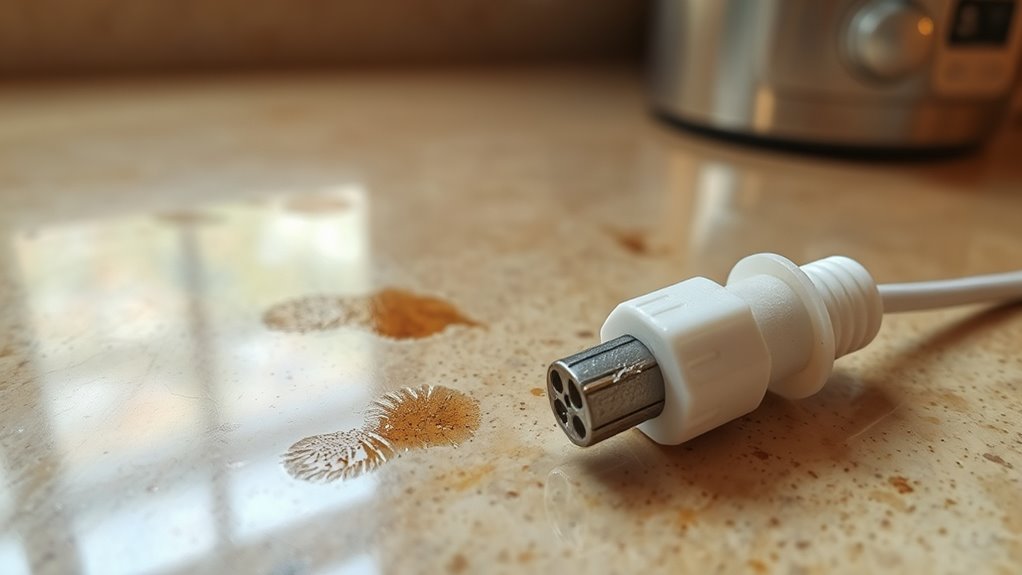
Using vinegar to clean small household appliances may seem convenient, but it can cause significant damage over time. Vinegar damage to small appliances occurs when the acidity corrodes internal components, leading to malfunctions. Repeated descaling with vinegar can degrade rubber seals and hoses, increasing leaks and reducing appliance lifespan. The acidity also harms plastic components, causing cracks or clouding that impair function. Additionally, using vinegar in appliances not designed for it may void warranties, making repairs costly. Over time, appliance corrosion from vinegar can necessitate frequent appliance repair or replacement. Experts recommend using manufacturer-approved cleaning agents instead of vinegar to preserve your appliances’ integrity, ensure proper operation, and extend their lifespan. Avoid risking damage—choose safer cleaning methods for your small household devices.
Frequently Asked Questions
What Surfaces Should You Not Use Vinegar On?
You should avoid using vinegar on natural stone surfaces like marble and limestone because it can cause permanent etching and dullness. Don’t use it on unsealed grout, as it weakens the material over time. Keep vinegar away from wood floors and furniture, since it strips protective finishes. Also, avoid applying vinegar on metals like stainless steel, aluminum, and copper, as it can cause corrosion and tarnish their appearance.
Why Shouldn’t You Clean With Vinegar?
Did you know that over 60% of homeowners experience damage from improper cleaning? You shouldn’t clean with vinegar because its acidity can harm many surfaces. It dulls natural stone, weakens grout, and dissolves protective finishes on hardwood floors. Plus, vinegar can corrode metal, damage rubber, and cause leaks in appliances. Using vinegar might seem like a natural choice, but it often leads to costly repairs and irreversible damage.
Is Vinegar Harmful to Hardwood Floors?
Yes, vinegar can be harmful to your hardwood floors. Its acetic acid dissolves the protective polyurethane or wax finish, causing dullness and scratches. Regular use can lead to a cloudy or streaky look, diminishing shine over time. If your floors are unsealed or damaged, vinegar can seep in, causing warping, swelling, or discoloration. To keep your floors looking their best, it’s better to avoid using vinegar for cleaning.
What Does Vinegar Do Around the House?
You might think vinegar is a versatile cleaner, but it actually causes damage around your house. It can etch natural stone, weaken sealants, and corrode metal parts. On hardwood floors, it strips protective finishes, leading to dullness. It can also harm rubber seals in appliances, causing leaks. Instead, use gentler, appropriate cleaners to protect your surfaces and avoid costly repairs over time.
Conclusion
So, next time you reach for vinegar, remember it’s like using a sledgehammer on delicate glass—effective but damaging. I once watched my friend ruin her marble countertop after a careless splash, reminding me that what seems like a simple fix can cause lasting harm. Protect your home by reserving vinegar for safe cleaning. Think of it as a gentle hand, not a reckless hammer, to keep your surfaces shining without the scars.
